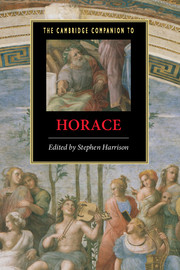Book contents
- Frontmatter
- Introduction
- Part 1: Orientations
- Part 2: Poetic Genres
- Part 3: Poetic Themes
- 12 Philosophy and ethics
- 13 Gods and religion
- 14 Friendship, patronage and Horatian sociopoetics
- 15 Wine and the symposium
- 16 Erotics and gender
- 17 Town and country
- 18 Poetics and literary criticism
- 19 Style and poetic texture
- Part 4: Receptions
- Dateline of works and major political events
- Works cited
- Index
17 - Town and country
from Part 3: - Poetic Themes
Published online by Cambridge University Press: 28 May 2007
- Frontmatter
- Introduction
- Part 1: Orientations
- Part 2: Poetic Genres
- Part 3: Poetic Themes
- 12 Philosophy and ethics
- 13 Gods and religion
- 14 Friendship, patronage and Horatian sociopoetics
- 15 Wine and the symposium
- 16 Erotics and gender
- 17 Town and country
- 18 Poetics and literary criticism
- 19 Style and poetic texture
- Part 4: Receptions
- Dateline of works and major political events
- Works cited
- Index
Summary
The tension and interplay between town and country form a key theme in Horace’s poetry, and have significant philosophical and ideological implications. This chapter seeks to explore this important poetic material and its presentation in the different genres and periods of Horace’s output.
A divided existence?
The theme of town and country appears in the first programmatic poem of Horace’s first poetry book, Satires (35 BC) - Satires 1.1.8-9:
agricolam laudat iuris legumque peritus,
sub galli cantum consultor ubi ostia pulsat;
ille, datis vadibus qui rure extractus in urbem est,
solos felicis viventis clamat in urbe.
The expert in law and statute praises the farmer, when a client knocks on his door at cock-crow; the farmer, dragged from country to city on court surety, cries that only those who live in the city are happy.
This split between urban and rural life, here couched in the ironic context of criticising mempsimoiria, discontent with one’s own lot, and applied to lifestyles paradigmatic of the two environments, is a major Horatian topic. Like most Romans of the first century BC, Horace’s existence, both practical and poetical, oscillated between rus and urbs: the tension between his natural inclination for the quiet life in the country, with its peaceful space for reading, writing and thinking, and the bustle of Rome, with its round of social and other duties, is often brought out in his work.
- Type
- Chapter
- Information
- The Cambridge Companion to Horace , pp. 235 - 247Publisher: Cambridge University PressPrint publication year: 2007
- 2
- Cited by

